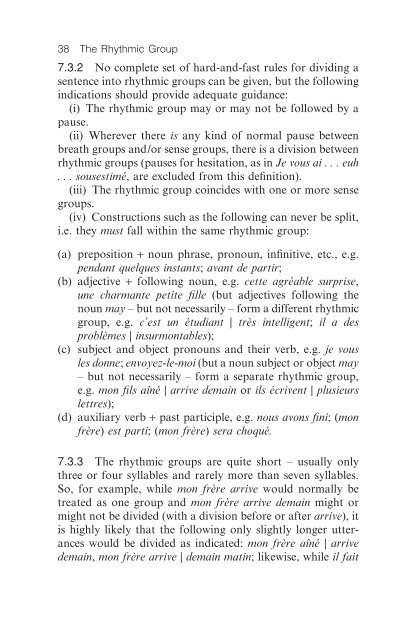An Introduction to French Pronunciation
An Introduction to French Pronunciation
An Introduction to French Pronunciation
You also want an ePaper? Increase the reach of your titles
YUMPU automatically turns print PDFs into web optimized ePapers that Google loves.
38 The Rhythmic Group<br />
7.3.2 No complete set of hard-and-fast rules for dividing a<br />
sentence in<strong>to</strong> rhythmic groups can be given, but the following<br />
indications should provide adequate guidance:<br />
(i) The rhythmic group may or may not be followed by a<br />
pause.<br />
(ii) Wherever there is any kind of normal pause between<br />
breath groups and/or sense groups, there is a division between<br />
rhythmic groups (pauses for hesitation, as in Je vous ai . . . euh<br />
. . . sousestimé, are excluded from this definition).<br />
(iii) The rhythmic group coincides with one or more sense<br />
groups.<br />
(iv) Constructions such as the following can never be split,<br />
i.e. they must fall within the same rhythmic group:<br />
(a) preposition + noun phrase, pronoun, infinitive, etc., e.g.<br />
pendant quelques instants; avant de partir;<br />
(b) adjective + following noun, e.g. cette agréable surprise,<br />
une charmante petite fille (but adjectives following the<br />
noun may – but not necessarily – form a different rhythmic<br />
group, e.g. c’est un étudiant | très intelligent; il a des<br />
problèmes | insurmontables);<br />
(c) subject and object pronouns and their verb, e.g. je vous<br />
les donne; envoyez-le-moi (but a noun subject or object may<br />
– but not necessarily – form a separate rhythmic group,<br />
e.g. mon fils aîné | arrive demain or ils écrivent | plusieurs<br />
lettres);<br />
(d) auxiliary verb + past participle, e.g. nous avons fini; (mon<br />
frère) est parti; (mon frère) sera choqué.<br />
7.3.3 The rhythmic groups are quite short – usually only<br />
three or four syllables and rarely more than seven syllables.<br />
So, for example, while mon frère arrive would normally be<br />
treated as one group and mon frère arrive demain might or<br />
might not be divided (with a division before or after arrive), it<br />
is highly likely that the following only slightly longer utterances<br />
would be divided as indicated: mon frère aîné | arrive<br />
demain, mon frère arrive | demain matin; likewise, while il fait












